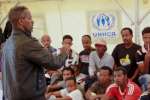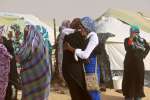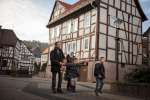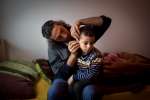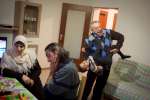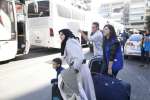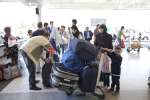- Text size
 |
|  |
|  |
| 
- Français
Chilly Iceland gives a warm welcome to South American refugees
News Stories, 4 January 2008
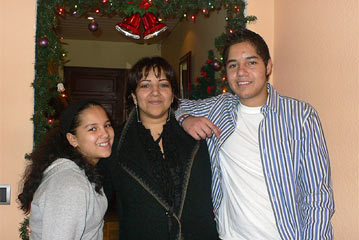
STOCKHOLM, Sweden, January 4 (UNHCR) – For women in the South American country of Colombia, the decades-long struggle between the government and irregular armed groups could not be more personal.
"The groups wanted to recruit my 17-year-old son," said Colombian refugee Marta, now safely in the Iceland capital Rejkjavik, where she was reached by telephone. "We had already fled twice, first to my mother's village and then further to Ecuador, but they managed to trace us and threatened to take my son and kill me for hiding him. We were all very scared," she added.
Marta is one of eight Colombian women – all single mothers with their children – who were recently resettled in Iceland with help from the UN refugee agency. UNHCR considered the group of 30 in urgent need of resettlement; some of the women had even left husbands who wanted their sons to help armed groups.
Iceland, a Nordic land of glaciers and geysers with the lowest population density in Europe, has resettled 247 refugees through UNHCR since 1996, including about 130 from Colombia. During the past few years, Iceland has focused on resettling single women and single mothers with their children.
"Being a single mother is very normal and common in Iceland, and the society is well equipped to assist them," said Atli Thorstensen, project manager for refugees and asylum seekers at the Icelandic Red Cross. "Therefore Iceland gladly accepted UNHCR's request to focus in resettling vulnerable women."
For Marta and the others, the move to Iceland was a plunge into the unknown. "I knew nothing of Iceland in advance. I did not even know such a country existed," Marta said. "The Red Cross showed us a film, and I was surprised how white the people looked. I was afraid they would find us ugly."
In fact, she recalled, the welcome could not have been warmer. Iceland has a well-established integration programme for resettling refugees. New arrivals are provided with housing in Reykjavik, where they are first settled. The first six to 12 months are dedicated to learning the language and adjusting to the new environment.
Refugees also receive vocational training and help in finding employment after completing the integration programme. Finding a job is not a major problem in Iceland, where an unemployment rate below 1 percent means workers are in high demand.
The Red Cross also runs voluntary programmes, giving each refugee family several Icelandic support families who help with everyday errands and provide a social network.
Marta is especially grateful for the new worlds that have opened up for her children. "We have a wonderful home here. Children can go to school, which would not have been possible in Colombia, and even play football and go swimming. I would never have been able to give these opportunities to my children back home."
On these cold winter days, when the sun appears for only three or four hours, Marta is looking forward to June and July, with their days and nights of unbroken sunlight. "It is very strange with the snow and darkness. We look very much forward to seeing the midnight sun. These are all very extraordinary things we have not experienced before."
Despite missing her mother and her homeland, what Marta prizes above all else in Iceland is the feeling of security. "We feel so safe here," she said. "We can go to sleep without being afraid, and that is what really counts."
By Mira Banerjee and Kiki Rodriguez Norman in Stockholm, Sweden





